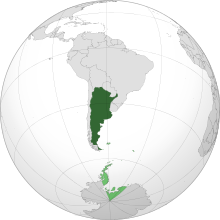अर्जेंटाइना
(अर्जेंटीना से अनुप्रेषित)
अर्जेन्टीना दक्खिन अमेरिका महादीप में एगो देस बाटे।
Argentine Republic[A] República Argentina (स्पैनिश) | |
|---|---|
मोटो:
| |
राष्ट्रगान:
| |
 Mainland Argentina shown in dark green | |
| राजधानी आ सभसे बड़ शहर | Buenos Aires |
| ऑफिशियल भाषा | Spanish[a] |
| एथनिक ग्रुप |
|
| लोग कहाला |
|
| सरकार | Federal presidential constitutional republic |
| बिधायिका | Congress |
• ऊपरी सदन | Senate |
• निचला सदन | Chamber of Deputies |
| Independence from Spain | |
| 25 मई 1810 | |
• Declared | 9 July 1816 |
| 1 मई 1853 | |
| 29 अप्रैल 1857 | |
| रकबा | |
• कुल | 2,780,400 किमी2 (1,073,500 वर्ग मील)[B] (8th) |
• जल (%) | 1.57 |
| जनसंख्या | |
• 2014 अनुमान | 42,669,500[4] |
• 2010 जनगणना | 40,117,096[3] (32nd) |
• Density | 14.4/किमी2 (37.3/वर्ग मील)[3] (212th) |
| जीडीपी (पीपीपी) | 2015 अनुमान |
• कुल | $953.029 billion[5] (25th) |
• प्रति ब्यक्ति | $22,459[5] (57th) |
| जीडीपी (नॉमिनल) | 2015 अनुमान |
• कुल | $563.138 billion[5] (21st) |
• Per capita | $13,271[5] (54th) |
| गिनी (2011) | medium |
| एचडीआइ (2013) | very high · 49th |
| करेंसी | Peso ($) (ARS) |
| टाइम जोन | ART (यूटीसी−3) |
| तारीख प्रारूप | dd.mm.yyyy (CE) |
| ड्राइविंग | right[b] |
| कालिंग कोड | +54 |
| ISO 3166 कोड | AR |
| इंटरनेट टीएलडी | .ar |
नोट
संपादन करीं- ↑ Article 35 of the Argentine Constitution gives equal recognition to the names "United Provinces of the River Plate", "Argentine Republic" and "Argentine Confederation" and authorizes the use of "Argentine Nation" in the making and enactment of laws.[1]
- ↑ Area does not include territorial claims in Antarctica (965,597 km2, including the South Orkney Islands), the Falkland Islands (11,410 km2), the South Georgia (3,560 km2) and the South Sandwich Islands (307 km2).[3]
- ↑ Though not declared official de jure, the Spanish language is the only one used in the wording of laws, decrees, resolutions, official documents and public acts.
संदर्भ
संपादन करीं- ↑ Constitution of Argentina, art. 35.
- ↑ Crow 1992, p. 457: "In the meantime, while the crowd assembled in the plaza continued to shout its demands at the cabildo, the sun suddenly broke through the overhanging clouds and clothed the scene in brilliant light. The people looked upward with one accord and took it as a favorable omen for their cause. This was the origin of the ″sun of May″ which has appeared in the center of the Argentine flag and on the Argentine coat of arms ever since."; Kopka 2011, p. 5: "The sun's features are those of Inti, the Incan sun god. The sun commemorates the appearance of the sun through cloudy skies on मई 25, 1810, during the first mass demonstration in favor of independence."
- ↑ 3.0 3.1 3.2 "Población por sexo e índice de masculinidad. Superficie censada y densidad, según provincia. Total del país. Año 2010" (XLS). Censo Nacional de Población, Hogares y Viviendas 2010 (Spanish में). Buenos Aires: INDEC – Instituto Nacional de Estadística y Censos. 2010. Archived from the original on 8 June 2014.
- ↑ "Cuadro 1. Población estimada al 1 de julio de cada año calendario por sexo. Total del país. Años 2010–2040" (XLS). Censo Nacional de Población, Hogares y Viviendas 2010 (Spanish में). Buenos Aires: INDEC – Instituto Nacional de Estadística y Censos. 2010. Archived from the original on 8 June 2014.
- ↑ 5.0 5.1 5.2 5.3 "Argentina". World Economic Outlook Database. International Monetary Fund. अप्रैल 2015. Retrieved 5 जुलाई 2015.
- ↑ "GINI index (World Bank estimate)". World Bank. Retrieved 5 जुलाई 2015.
- ↑ "Human Development Report 2014 – Summary" (PDF). New York, NY, USA: United Nations Development Programme. 2014. pp. 15, 16. Archived (PDF) from the original on 27 July 2014.
- ↑ Ley No. 5598 de la Provincia de Corrientes, 22 de octubre de 2004
- ↑ Ley No. 6604 de la Provincia de Chaco, 28 de julio de 2010, B.O., (9092)
| विकिमीडिया कॉमंस पर संबंधित मीडिया Argentina पर मौजूद बा। |
| ई दक्खिन अमेरिका के अस्थान या भूगोल से संबंधित लेख एगो आधार बाटे। जानकारी जोड़ के एकरा के बढ़ावे में विकिपीडिया के मदद करीं। |


